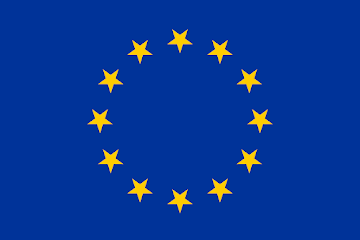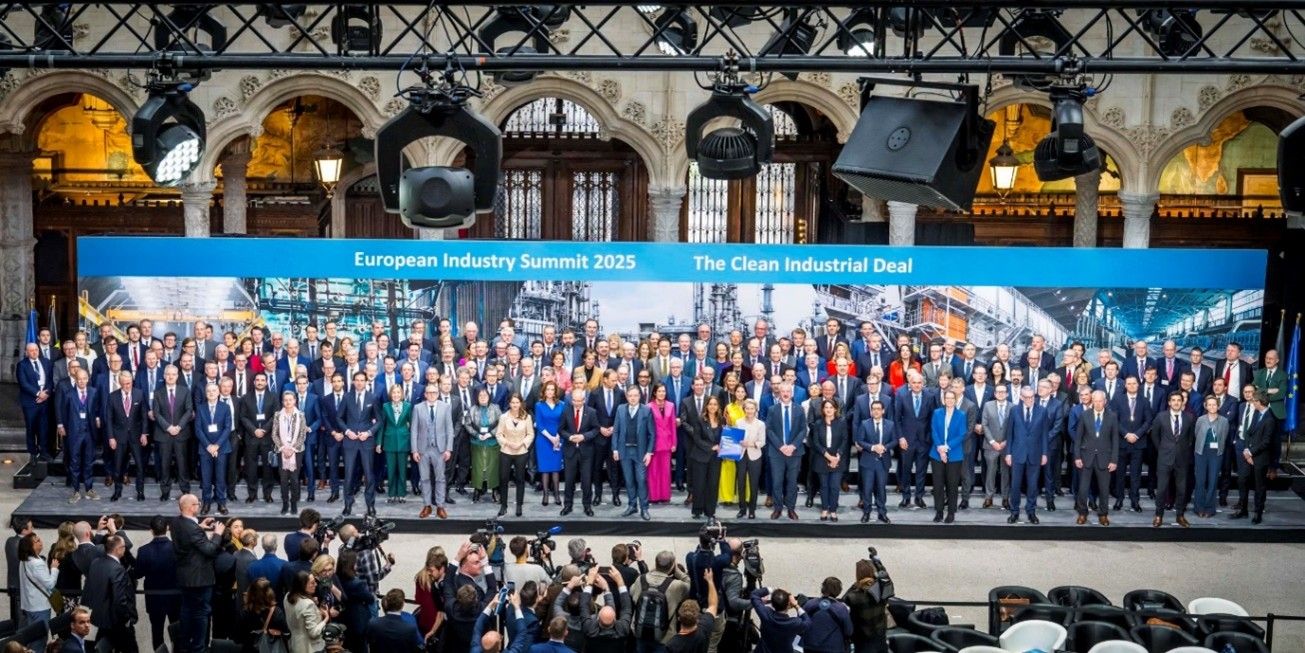On 26 February 2025, one year after the launch of the Antwerp Declaration and 100 days after the new European Commission came in office, 400 business leaders have reunited in Antwerp to discuss the just published Clean Industrial Deal with European Commission (EC) President, Ursula von der Leyen, during a high-level meeting. The EC’s presence in Antwerp shows its engagement and focus on competitiveness.
The Clean Industrial Deal is a business plan to support the competitiveness and resilience of the industry. The Deal will accelerate decarbonisation, while securing the future of manufacturing in Europe. The Deal positions decarbonisation as a powerful driver of growth for European industries. This framework can drive competitiveness as it gives certainty and predictability to companies and investors that Europe remains committed to become a decarbonised economy by 2050.
The EC is also taking actions to make regulatory environment more efficient while reducing bureaucratic hurdles for businesses. Proposed measures are the results of the active engagement with industry leaders, social partners and civil society in the context of the Antwerp Declaration for a European Industrial Deal and the EC's Clean Transition Dialogues.
The Deal focuses mainly on two closely linked sectors:
- Energy-intensive industries which require urgent support to decarbonise and electrify. The sector faces high energy costs, unfair global competition and complex regulations, harming its competitiveness.
- Clean Tech which is at the heart of future competitiveness and growth as well as crucial for industrial transformation. Circularity is also a central element of the Deal, as there is a need to maximise EU's limited resources and reduce overdependencies on third country suppliers for raw materials.
The Deal presents measures strengthening the entire value chain. It serves as a framework to tailored actions in specific sectors (automotive, steel & metals, chemical, clean tech).
The dedicated Communication identifies business drivers for industry to succeed in the EU:
- Lower energy costs à Action Plan on Affordable Energy to lower energy bills for industries, businesses and households.
- Boosting demand for clean products à Industrial Decarbonisation Accelerator Act to increase demand for EU-made clean products by introducing sustainability, resilience, and made in Europe criteria in public and private procurements. The Industrial Decarbonisation Accelerator Act will also launch a voluntary carbon intensity label for industrial products, starting with steel in 2025, followed by cement.
- Financing the Clean Transition à Clean Industrial Deal State Aid Framework, Innovation Fund, Industrial Decarbonisation Bank, increased InvestEU's risk bearing capacity, 100 billion EUR to support EU-made clean manufacturing. The European Investment Bank (EIB) Group will also launch a series of concrete new financing instruments to support the Clean Industrial Deal.
- Circularity and access to materials à EU Critical Raw Material Centre to jointly purchase raw materials on behalf of interested companies. Circular Economy Act in 2026 to accelerate the circular transition and ensure that scarce materials are used and reused efficiently. The aim is to have 24% (compared to 12%) of materials circular by 2030.
- Acting on a global scale à Clean Trade and Investment Partnerships which will diversify supply chains and forge mutually beneficial deals. At the same time, the EC will act even more decisively to protect industries from unfair global competition and overcapacities through a range of Trade Defence and other instruments.
- Ensuring access to a skilled workforce à Union of Skills.
The Antwerp Declaration, now signed by over 1300 companies and associations, including FEP, and presented in February 2024, lays out ten concrete actions to restore the business case for investments, to implement Europe’s sustainability ambitions and safeguard quality jobs in Europe. Nine out of its ten calls have been addressed in the Clean Industrial Deal.
We need now to transform Europe’s ambition ‘to be’ into a determination ‘to do’ while Europe’s industries are facing historical challenges: declining demand, stalled investments, reduced capacity, and EU gas prices 4-5 times higher than its competitors. Between 2023 and 2024, Europe’s manufacturing output - a sector employing over 31 million people - dropped another 2.6%.
Ahead of the European Council meeting in March, industry is calling on EU Heads of State to take urgent actions across all EU Member States to implement the Clean Industrial Deal without any delay. When we say actions, we mean actions, not strategies, policies or plans. We need the Deal to be delivered.
Industry also calls on all new EU initiatives to be evaluated against the following criteria:
- Do they keep Europe safe and independent?
- Do they reduce energy prices?
- Do they ease the administrative burden on companies?
- Do they attract investments to Europe?
- Do they create markets for sustainable - low-carbon and circular - products?
- And do they safeguard/secure quality jobs for European workers in Europe?
If the answer to any of these questions is no, EU policymakers should reconsider and revise the proposal accordingly.
The Antwerp Declaration remains an urgent call to revitalise Europe’s industrial landscape. Europe’s industries stand ready to do their part and continue supporting policymakers in building a competitive, resilient and sustainable future in Europe amid shifting geopolitics.
Time has now come to start measuring progress towards the key asks of the Antwerp Declaration. To this end, Deloitte, in collaboration with the sectors that have signed the Antwerp Declaration, is aiming at developing a Monitoring Framework. The goal of this Framework is to measure progress on the pillars of the Antwerp Declaration through a set of Key Performance Indicators (KPIs). To hold the EU accountable for the progress, the KPIs will focus on the enabling conditions rather than the performance of the industry.
A survey is currently collecting feedback before finalizing the set of KPIs. Once finalized, a first report on the Monitoring Framework (including a detailed description of the KPIs) will be published on the Antwerp Declaration website. Then, a data collection exercise will take place in order to actually measure the progress (most probably on an annual basis) of the KPIs.




